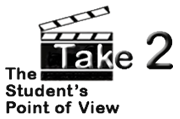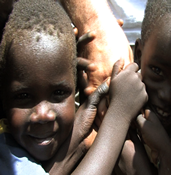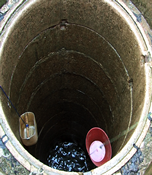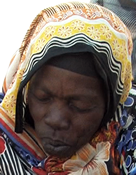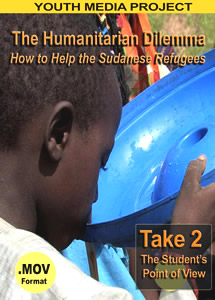
THE HUMANITARIAN DILEMMA
How to Help the Sudanese
How do you help them to rebuild their lives without
taking away their dignity and their ability to help themselves?
This Module Contains:
-
General DVD with 2.10 hours of digital footage of general life in Sudan.
-
Topic-specific DVD with 3.5 hours of digital footage of humanitarian issues within a refugee camp
-
Transcripts of two interviews translated into English.
-
Comprehensive background information and summary materials (sample) of the footage, including flowcharts (sample).
-
Cutting-edge curriculum: teaching unit (sample) supporting social science standards complete with class activities, grading rubrics, four PowerPoint presentations (sample), lecture materials, graphic organizers, homework assignments, a video on how to use the footage, and student briefing materials (sample).

What is an NGO? Twenty thousand people live in the refugee camp of Farchana in eastern Chad, which was founded in 2004. There is little vegetation or water, and only basic sanitation. Leaving the camp, even for brief periods of time to gather wood, is dangerous and often forbidden. Very little 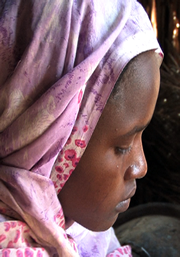 governmental aid from other countries actually reaches individuals. It is left to Non-Government Organizations to provide the care and assistance to sustain life for the Sudanese. What kinds of NGOs exist in Farchana Camp? How do they
governmental aid from other countries actually reaches individuals. It is left to Non-Government Organizations to provide the care and assistance to sustain life for the Sudanese. What kinds of NGOs exist in Farchana Camp? How do they 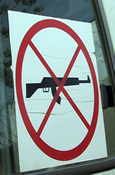 work? Who are humanitarian workers, and what are their lives like? What kinds of help do they bring to the camp? How are goods and services distributed? What happens to people who receive assistance year after year with little hope of returning to their villages or any semblance of their former life? And how does the dream of global humanitarian aid differ from the reality? Students will examine global citizenship through the lens of Farchana Camp, the refugees who live there, and the individuals who support and nurture them.
work? Who are humanitarian workers, and what are their lives like? What kinds of help do they bring to the camp? How are goods and services distributed? What happens to people who receive assistance year after year with little hope of returning to their villages or any semblance of their former life? And how does the dream of global humanitarian aid differ from the reality? Students will examine global citizenship through the lens of Farchana Camp, the refugees who live there, and the individuals who support and nurture them.
Teaching Unit Overview: Global interdependence requires understanding global connections between countries, governments, independent organizations, and individuals. Health care, human rights, economic development, and the environment are all issues that create tension between those involved and those governing. How these factors are addressed inside a Chadian refugee camp for Sudanese, most of whose villages were burned by rebel groups, is the subject of this unit. Ultimately, does humanitarian assistance provide for the long-term care and safety of refugees in ways that allow the Sudanese to retain their culture and values?
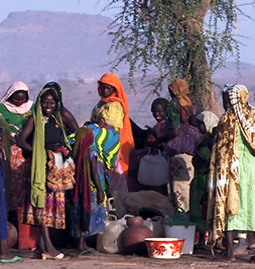
Footage Highlights:
-
Food and water distribution
-
Doctors without Borders
-
Individual NGO workers
-
School lunch program
-
Work projects for women
-
NGO headquarters
-
Daily life inside an NGO
-
Wood distribution
-
Refugee camp mediation
One-year, single classroom educational license: $250. Introductory price: $95.
Site license: contact Take 2
District license: contact Take 2

